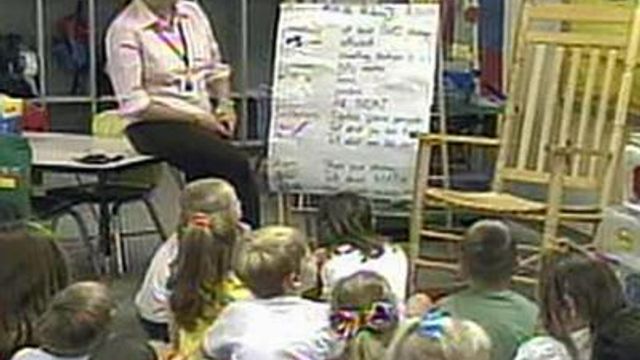State Education Board Tells Wake to Cut Class Sizes
A state order to reduce class sizes at 13 Wake County elementary schools could mean students will be switching classrooms halfway through the year.
Posted — UpdatedThe Wake County Public School System had sought waivers to allow 25 classes at 13 elementary schools to exceed state class-size limits. Kindergarten through third-grade classes must not exceed 18 students or an average student-teacher ratio between 21 and 24 to 1.
By Feb. 11, the WCPSS must give the state board an action plan to reduce class sizes immediately, as well as in the 2008-2009 school year.
"The board is very strongly committed to small class sizes," said J.B. Buxton, deputy superintendent of the state Department of Public Instruction. "Small class sizes in early grades lead to better achievement, better behavior, better parent-teacher interactions."
School administrators said they are scrambling to avoid breaking up classes halfway through the school year. With Wake County's population growth, quickly reducing the size of existing classes is a hard task, school officials said.
"Wake County has been growing by 6,000 students a year. That's two classrooms of children every school day," Michael Evans, WCPSS communications director, said.
The elementary schools for which WCPSS had sought waivers include Fred Olds and Hillburn Drive in Raleigh, Rolesville and Weatherstone in Cary. With four overcrowded classrooms, East Garner had the largest number that exceed state class-size limits.
Thomas Wing, the parent of a child in an overcrowded classroom at Olds, said he thinks the class size has not hampered his daughter's progress, but he fears it might if the class gets any bigger.
"I think we're maxed out in her current class," Wing said. "Although it seems to be working well, I wouldn't like to see it be a higher ration than what it is already."
School officials said they are weighing their options to get more teachers in the classroom, but added that can not be done quickly.
"We can ask the state board for more money to hire teachers. We've got schools converting positions to teachers, bringing in extra teachers' assistants to hep with the instructional day," Evans said.
"We're going to take a look at our options, take some recommendations back to the board, and then see where things go," he added.
In January, the State Board of Education granted exemptions from the class-size limits to 114 Wake County elementary school classrooms. Board members based that decision on a judge's ruling that attendance at year-round schools was not mandatory.
WakeCARES, the plaintiff in a lawsuit over year-round schooling that has gone to the state Supreme Court, said it sent its concerns to Gov. Mike Easley after the state board granted the first waivers to the WCPSS.
"The recent denial of WCPSS's second round of class-size waivers raises additional concerns regarding the many problems created by the poor decisions and planning of the Wake County Board of Education," read a statement released by WakeCARES on Thursday.
"Rather than addressing the need of families, WCPSS has insisted on further overcrowding traditional calendar schools, while leaving year-round schools under-capacity yet with overcrowded classes on certain classes," the statement continued.
On Monday, WCPSS must also explain to the state board how it notified parents of the excessive classroom sizes and how it handled reassignment requests from parents of students in overcrowded classrooms.
If the WCPSS fails to show it met those requirements, the state board could levy financial sanctions against Del Burns, WCPSS superintendent of schools, by withholding part of his six-figure salary.
• Credits
Copyright 2024 by Capitol Broadcasting Company. All rights reserved. This material may not be published, broadcast, rewritten or redistributed.





